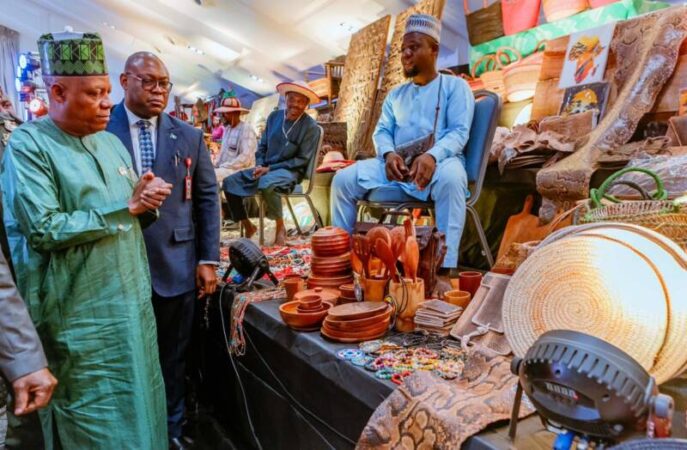President Bola Tinubu has called on African nations to embrace environmentally conscious tourism practices and safeguard their cultural heritage.
The Nigerian leader, represented by Vice President Kashim Shettima, delivered this message on Wednesday at the 68th meeting of the UN Tourism Commission for Africa (CAF) in Abuja.
Tinubu urged attendees to devise practical solutions and forge alliances that would attract significant investment into tourism infrastructure.
His aim is to elevate the sector’s contribution to achieving the Sustainable Development Goals (SDGs) across the continent, thereby boosting economies and fostering long-term prosperity.
He declared that Africa is poised to become central to global discussions on harnessing tourism’s full economic potential.
Nigeria, through its collaboration with regional bodies like the African Union and ECOWAS, as well as UN Tourism, actively encourages other African nations to champion eco-friendly tourism initiatives and protect their rich cultural patrimony.
This collaborative approach, he explained, includes exchanging successful models, providing tourism training, developing joint marketing campaigns for sustainable tourism, and upgrading infrastructure to facilitate seamless intra-African travel.
These regional efforts, he believes, can ignite a continent-wide movement towards tourism that benefits both its people and its environment.
The Nigerian head of state observed that tourism extends far beyond “travelling or visiting historic sites, waterfalls, mountains, and parks,” emphasizing its role as “an engine of local economies, a catalyst for social understanding, and a bridge that unites cultures.”
He highlighted that the advent of technology and creativity has revolutionized tourism opportunities, making it fitting that the conference addresses the transformative influence of artificial intelligence (AI), groundbreaking innovation, and vibrant creative industries on the sector.
Highlighting Nigeria’s robust creative industries—spanning music, film, fashion, literature, and digital arts—Tinubu noted their emergence as a potent catalyst for economic growth, making substantial contributions to the nation’s GDP, job creation, and economic diversification.
He specifically cited Nollywood, one of the world’s largest film industries, for generating significant revenue domestically and internationally.
RECOMMENDED POSTS
Similarly, Nigeria’s music and fashion industries have amplified the country’s global cultural resonance, simultaneously creating income and employment opportunities.
The President stressed that governments cannot develop the tourism sector unilaterally, asserting the critical need for strategic partnerships with the private sector given the industry’s increasing complexity and opportunities.
Opening the regional meeting, the Nigerian leader implored participants to concentrate on practical solutions and collaborative strategies.
These, he said, should strengthen continental travel, attract capital into tourism infrastructure, uplift indigenous communities, enhance tourism’s role in advancing the SDGs, and position African tourism at the heart of global discourse.
Earlier, Barrister Hannatu Musa Musawa, the Minister of Art, Culture, Tourism, and Creative Economy, urged African nations to capitalize on ingenuity, artificial intelligence, and creative sectors to unlock the continent’s immense capacity in global tourism.
Expressing profound belief in President Tinubu’s vision for Nigeria, Musawa affirmed that his leadership would enable the country to join the league of developed nations. She extended this aspiration to all African nations, calling for collective progress.
The Minister noted that President Tinubu’s “Renewed Hope Agenda” serves as the core philosophy for Nigeria’s sectoral transformation.
She stressed that “Africa stands at the forefront of change. The 21st century demands that we build economies not just from the ground but on people-powered prosperity, through tourism, culture, the creative economy and the arts.”
Musawa highlighted the event’s theme, “Boosting Social Impact and Education in Tourism via Innovation, AI, and Creative Industries in Africa,” underscoring that Africa’s future prosperity hinges on its bold and expansive utilization of technology to empower its populace.
She pointed out that while the global tourism industry exceeds $11 trillion in valuation, Africa commands less than 5% of global tourism revenue and under 1% of global creative exports.
“This is not indicative of a lack of talent or resources. Today, Nigeria invites Africa to close that gap,” she declared.
On his part, UN Tourism Secretary-General Amb. Zurab Pololikashvi applauded the Tinubu administration for its support in transforming Nigeria’s tourism industry, anticipating a positive ripple effect across the continent.
Underscoring tourism as Africa’s future, he affirmed the continent as the emerging landscape in world tourism, citing its vast potential and limitless opportunities for innovation and creativity.
Amb. Pololikashvi appealed to African leaders to address issues related to continental connectivity by revisiting current visa regulations, aiming to facilitate seamless tourist flow across Africa and beyond.
Senator Ireti Kingibe, representing the FCT at the National Assembly, encouraged stakeholders across Africa to embrace audacious thinking, emphasizing that Africa is not merely participating in the digital future of tourism but actively shaping it.
She added that Nigeria, with its immense creativity and rich cultural endowment, is poised to lead. The resilience and culture of Africans, combined with emerging technologies like AI and immersive media, she noted, can redefine continental perception and how Africa is experienced, studied, and valued.
“Today’s gathering is an opportunity to amplify the narratives of home-grown innovations that attract tourists from the grassroots to the global stage. Let us use this space to exchange best practices, build cross-border collaborations, and generate actionable strategies that center development initiatives around communities, especially women and youths,” she concluded.
